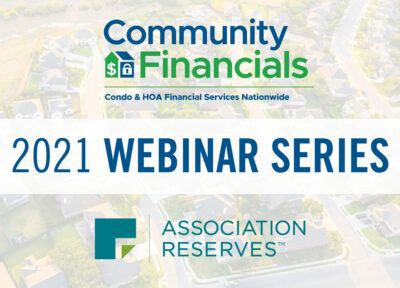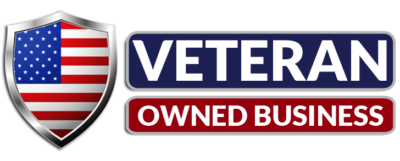If you missed it we had an information-packed webinar on Fiscal Responsibility and Best Practices a few weeks ago on May 12, 2021. We received a lot of great questions from the audience that I wanted to share with you as I thought would help answer your questions that may be similar.
Q: Is “owner equity” typically on the Balance Sheet? Is that the walls, roofs, concrete, etc., example you showed?
A: Yes, owners’ equity is always on the Balance Sheet. It is made up of all prior years’ operating surplus and any fixed assets. This means from the day the HOA started through the end of the previous fiscal year this is the difference between any fixed assets and all income collected, less all expenses paid, fewer allocations to the reserve fund.
Q: What to do when only the president and the treasurer having access to the bank statements and the two vice presidents don’t? Also, no other directors! President and Treasurer also are the ones managing the association! With no management company or accountant.
A: If you have 2 board members that is better than only 1 for checks and balances. In many communities, we work with the signers on the bank account are the President, Treasurer, and the Secretary and they have online access to the bank accounts. Some communities provide access to all board members. You can vote on this at a board meeting if other board members want access to view the accounts. However, the Treasurer should provide financial statements with bank statements monthly which would be reviewed by all board members for transparency.
Q: Are POAs allowed to require new owners to pay a lump sum deposit direct to the Reserve Account in their purchase/closing?
A: More communities are doing this as a way to add funds to their reserve account. This would have to be provided in the governing documents. If this is not in your current governing documents you can add it by an amendment. To do this be sure to consult your HOA attorney.
Q: Is it appropriate to hire a member to do work for the association (for example, painting a building)?
A: This is where conflict of interest can arise. Yes, you can hire a member to do work but you’ll want to make sure you collect several bids and the member wins the bid. You may also want to show this in the meeting minutes when it was voted on / the bid was approved. This way if any homeowners raise an issue there is backup to reduce any risk for the Board.
Q: We are a small (under 10) unit Association using a management company with a $500.00 monthly fee. Should we consider having an accountant look over our books?
A: It’s a best practice to have your association books audited every so often. This is typically based on the size of your budget and complexity of your association (with larger more complex doing this annually). I’ve seen smaller associations do a check-up every 3 years. There are different kinds of audits so make sure that you select the one that covers your intended purpose. The basic (cheapest) audit may not provide much value to the association other than checking the box that the board had the reports audited by an accountant.
Q: Is dual authorizations above a certain amount practical for HOAs?
A: It’s a best practice. All our client’s bills are approved by 2 people. That may be a property manager and then a board member or 2 board members (typically the Treasurer and President). This provides for transparency and checks and balances. Why take the risk if you are the board member approving all the payments and someone questions a payment? For some of our clients, the 2nd approver may only approve bills over $500 or $1000 but in most cases, both approvers approve all bills.
Q: Can the board change the budget midway through the year?
A: Yes. If your community’s circumstances changed this may be a good idea. Natural disaster, major repair needed high delinquencies. Then you may need to put off a scheduled project, do a special assessment, delay funding your reserve account, etc.
Q: Do you recommend a line of credit in the event of a potential disaster?
A: Yes, in fact, many communities in Florida with the exposure of a Hurricane have lines of credit set up for this. Always best to set it up before you need it as it will take a few weeks for the bank to underwrite.
Q: Should reserve payments be paid monthly from the operating account?
A: Yes. Make them regularly, so they don’t get neglected or “misspent” on Operating expenses.
Q: Is a prepaid credit card an alternative to an unlimited amount card where it will not be refilled until documentation is submitted and approved?
A: This is in reference to my saying that petty cash, debit cards, and credit cards open up the association to the risk of fraud. A prepaid card is not much different from a regular credit card with a spending limit. I would say first you want to use vendors and suppliers that will invoice the community and you can pay through your regular processing routine. If you have infrequent purchases outside of the normal payment routine the best bet is for a board member to purchase the item and then reimburse them. Our clients submit their invoices with a cover sheet and it goes through our online 2 board approval process and they get paid before their credit card statement is due.
Q: What are your thoughts on providing a Journal Entry report to boards as part of the monthly reporting package?
A: I think this is not necessary. My experience is the more reports like this that are given to the board the more they tend to confuse instead of help explain the community’s financial situation.
Q: How much can we increase the maintenance fees without a vote of owners?
A: It will depend on your state regulations and / or your governing documents. In many states, though it is 15%.
Q: Do you have suggestions for the type of reporting you do for your Reserve Fund activity…how much detail do the normal owners get?
A: Typically owners will get a copy of the year-end income and expense report as well as the balance sheet (usually posted to the online portal or by mail). On these whatever the break out of reserve items is what typically owners will see. If your community wants to share a schedule of reserve savings, income and expenses I have seen that provided as well.
Q: If an owner merely suspects financial irregularities, how do they tactfully address the issue without causing “friction”? Who should they approach?
A: It depends on who they suspect it from. As an owner, you can request a copy of the financial reports and you can look them over. If you find something, you can talk to the President or Treasurer (if they are not the suspect) and share your concerns.
Q: In what situation can you move money from your Reserves account to our operating account?
A: Most transactions are actually paid from the Operating account (for traceability). Reserve expenses should not be paid from the Reserve account. So to pay a Reserve expense, funds should be transferred first to the Operating account. Otherwise, it is either an improper use of Reserves or should be considered “borrowing” and a payback plan should be established.
Q: Can you show the 4 reports again? (I missed #3&4)
A: Please see our Outline and the recording and you can find more here: https://communityfinancials.com/4-best-condo-community-hoa-financial-reports/
Q: What can we do if the property management company refuses to provide financial statements or answer questions when the bank reconciliation statement does not match the income and expense report? I recognize that we can always leave the Property Management company but how do I know if money is missing or not without the data?
A: This is a big red flag. The board should request the financial reports and any required backup so that it can be analyzed and understood. If the manager wants to keep your business they should comply. If they still won’t provide the board with the information I suggest you have your HOA attorney write them a letter. Then they can help you attain the financial information. You may want to also hire an accountant to audit the financial reports.
Q: Our collection agency does not report to credit reporting agencies. Can we do the reporting?
A: You cannot do the reporting. The credit rating agencies have to approve the company providing the information. There is a company that can help with this called Sperlonga that we work with or you can use a different collection agency that bundles reporting in with their service.
Q: Please discuss appropriate investment options for reserves/capital improvement funds.
A: General best practice is to only make investments where there can be no loss of principle. That means “safe” investments, which likely means relatively low rates of return (less than inflation). It is one thing to “lose ground” against inflation (you can factor that into your multi-yr Reserve Funding plan). It is a very different thing to “lose money” in an investment that unexpectedly went south, suddenly catapulting your association into a special assessment situation!
Most associations use CDs and vary the term to match when the funds are needed for a capital replacement project. The longer the term the higher the interest. Beyond that, I would advise that the board not take on any additional risk themselves of “managing” money.
Q: Is there a link for the collection’s best practice sample policy?
A: Yes CLICK HERE.
Q: Any tips for updating signature cards?
A: If you work with a financial management or community management company they may do this for you. Otherwise, work with your banking contact and they will help you.
Q: We are implementing a special assessment that will cost homeowners $1,000 to $2,000. Should we charge an installment fee if we allow owners to pay the assessment over 6 or 12 months?
A: I typically don’t see any fee for special assessments. By their nature, they are typically 12 months or less in duration. Your main concern is to get the money and adding a fee is a penalty. I have seen where an association wants funds faster that they give a discount to owners if they pay in a lump sum.
Q: Are you saying we need two different bank accounts for Reserves and Operating Expenses?
A: Yes, this is a best practice. Then these 2 accounts are reflected on the Balance Sheet and you can see how much you have saved in reserves at a glance.


